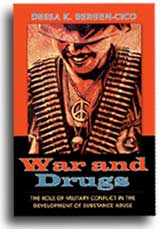College of Law’s Veterans Legal Clinic Receives Justice for Heroes Grant
The College of Law’s Betty and Michael D. Wohl Veterans Legal Clinic (VLC) has been awarded a Justice for Heroes grant by the New York State Department of Veterans’ Services. This competitive grant provides funding for the VLC to deliver high-demand legal…


 A recent report by the Institute of Medicine (IOM) points out some troubling statistics about substance abuse in the military, calling the situation a “public health crisis” and urging the Department of Defense to improve prevention and treatment care for service members.
A recent report by the Institute of Medicine (IOM) points out some troubling statistics about substance abuse in the military, calling the situation a “public health crisis” and urging the Department of Defense to improve prevention and treatment care for service members. “This data has been available; I just pulled it all together,” says Bergen-Cico ’86, G’88, G’92, who is lead faculty of addiction studies within the David B. Falk College of Sport and Human Dynamics and holds a research appointment at the Syracuse Veterans Affairs Medical Center (VAMC). “Even with the numbers out there, nobody seemed to care.”
“This data has been available; I just pulled it all together,” says Bergen-Cico ’86, G’88, G’92, who is lead faculty of addiction studies within the David B. Falk College of Sport and Human Dynamics and holds a research appointment at the Syracuse Veterans Affairs Medical Center (VAMC). “Even with the numbers out there, nobody seemed to care.”